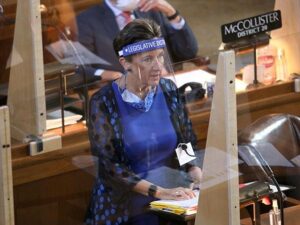He Said, She Said
 Before Monday, all state senators had not been in the same room since March 25. As the COVID interrupted legislative session came to order, a certain awkwardness was to be expected until the ship righted itself.
Before Monday, all state senators had not been in the same room since March 25. As the COVID interrupted legislative session came to order, a certain awkwardness was to be expected until the ship righted itself.
From the vantage point of a 55″ flat screen, the initial mojo reading was low in the George W. Norris Chamber. Senators were seated and socially distanced; surrounded by plexiglass; masks in the full and upright position; no staff in the chamber, and mass quantities of hand sanitizer cluttered their desktops.
An early dust-up Monday morning, and a doozie on Tuesday, were mere precursors to the eruption of personal attacks Friday morning. Visibly frustrated, Speaker Scheer adjourned the session early.
For the most part, bills were dispatched efficiently for the rest of the week. A dismemberment abortion bill (LB814) sent senators scrambling for the lifeboats before passing, and a much-maligned student discipline bill (LB 147) is now sleeping with the fishes.
The business incentive bill, LB 720, received time on the floor, as did the latest version of property tax relief, LB 1106. Both failed to advance.
The Revenue Committee met after the Friday morning session to discuss a remedy (that’s code for an amendment) that can gain 33 votes to pass both LB 720 and LB 1106. Rumor has it that the committee unceremoniously adjourned as some members took a walk.
Thursday, the Nebraska Economic Forecasting Advisory Board met. Members split on their official FY2020/21 forecast that is $145 million higher than projected by their national forecasting experts Moody’s and IHS. The estimate decreases state receipts by only $50 million, leaving a budget surplus of $88 million.
BTW, the climate change bill supported last week by Lee Enterprises’ newspapers and many children who lobbied their state senators, was frozen out.
Final Reading
LB803 (Hughes) MONITOR – SPEAKER PRIORITY BILL
- Creates a new promotional checkoff program for pulse crops, including dry peas, lentils, chickpeas or garbanzo beans, faba beans, and lupine. The bill also expands a waiver of a distance limitation for overweight/oversize vehicles transporting crops to include pulse crops.
General File
LB1159 (Stinner) SUPPORT
- Extends the initial training period for a noncertified pesticide applicator from 60 to 120 days prior to obtaining an initial commercial or noncommercial applicator license. The bill also authorizes unlimited exam attempts for the noncertified applicator during that training period.
Held In Committee
LB919 (Wayne / MONITOR)
- Hemp cultivator, processor-handler, and broker license and renewal applications shall only be denied if they are incomplete or deficient, including for nonpayment of the required application and registration fees, or if the applicant does not meet minimum qualifications.
LB946 (Briese / MONITOR)
- The bill lowers the sales tax rate and eliminates exemptions on services. Service includes all activities that are engaged in for other persons for a consideration and that involve predominantly the performance of a service as distinguished from selling or leasing tangible personal property.
LB1084 (Kolterman / MONITOR)
- The Nebraska Transformational Project Act would provide $300 million in state funding to the University of Nebraska Medical Center for their NExT Project. Before receiving $300 million, UNMC must show the economic impact to Nebraska is at least $2.7 billion during the planning and construction period and at least $4.9 billion over ten years.
- NExT Project has two components: a state of the art academic medical center facility and a federal all-hazard disaster response military and civilian partnership.
Failed to Advance
LB974 (Linehan) MONITOR – REVENUE COMMITTEE PRIORITY BILL
- A complex property tax reduction and school funding bill. As amended by AM2433, the bill would reduce property taxes as a significant source of funding for K-12 education. Unless expressly exempt:
- Real property would be valued at 95% of actual value for the tax year 2020, 91% in the tax year 2021, and 86% in 2022 and after that.
- Agricultural and horticultural land would be valued at 65% of actual value in the tax year 2020, for purposes of taxes levied by a school district and 75% of actual value for taxes levied by other political subdivisions.
- Agricultural and horticultural land would be valued at 60% of actual value in the tax year 2021, for purposes of taxes levied by a school district and 75% of actual value for taxes levied by other political subdivisions.
- Agricultural and horticultural land would be valued at 55% of actual value in the tax year 2022, and each tax year after that, for purposes of taxes levied by a school district and 75% of actual value for taxes levied by others
